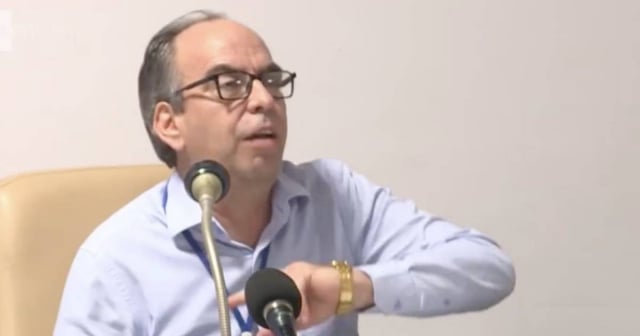Adilen Sardiñas is Cuban, a singer and lives in Serbia with the one-year-old baby she has in common with the British journalist Ed Augustin, a collaborator from Havana with The Guardian, Al Jazeera and The New York Times, although among the Cuban diaspora he is known for his defense of the theory of the "blockade" of the United States as responsible for the economic and migration crisis that Cuba is experiencing.
Sardiñas denounces in a video sent to CyberCuba that her ex, Ed Augustin, does not let her take her son off the Island, allegedly breaking the agreement they both had when she returned from Serbia, a country where she lives with their son and where she has her job, her house and his things.
Initially, mother and son arrived on the island with the intention of spending three months in Cuba, but as the time to return approached, problems arose. The father does not let the child leave the Island and, in this way, forces him to live in a country shaken by blackouts, water cuts, shortages and the inflationary crisis. "Last week we went eight days without water entering," says Sardiñas.
"They say that stories move mountains and hopefully, telling my story will help me in some way to move giant mountains that lie ahead of me," says the singer before referring to the economic situation that Cuba is experiencing. "I live in fear that my son will get sick," he says, referring to the shortage of medicines and the precarious conditions of the Island's health system.
"The paradox of my case is that, until recently, we lived well in Serbia. I had a job in music, my house, my friends. My belongings are still there. I had the possibility of giving my son a good life, but recently I shortly decided to return to Cuba so that my baby could share with his father, as we had agreed, and also because this is my land and I love it. But when I arrived here, his father, an English journalist, Ed Augustin, decided to change his mind and break our agreement, canceled the travel permit he had made for our baby and He even put us on the list of danger of escape at Customs. Therefore we are locked up here and I say locked up because without my baby I am not going anywhere and even less so with the situation that exists here in Cuba," Sardiñas added.
She also notes that in most of his articles Ed Augustin "speaks a lot and condemns the injustice of the 'blockade' of Cuba, when now he is carrying out this blockade against his own son."
Adilen Sardiñas has been in music for 12 years. The first five he was part of the Opera, with the Ópera de la Calle company, with which he performed at the Karl Marx theater and on Cuban television.
Shortly after, she dedicated herself to traditional music, forming part of trios, quintets, and sextets, especially in women's groups with which she performed in hotels and bars in Havana.
His first work trip abroad was in 2018, when he was in Türkiye. The following year she traveled to Montenegro, being part of a women's group, as a singer and pianist. Upon her return, she was stopped for a year due to the pandemic and in 2021 she traveled again to Serbia and Montenegro doing Latin music and jazz. Again, back in Cuba, she was unemployed for a year due to pregnancy and after the birth of her son she returned to Serbia and Montenegro, where she continued working in the world of music.
"The life of musicians in Cuba is difficult. I have performed on many stages here, but where I really made some money was in bars and hotels with small groups working basically for tips from foreigners. That's how I managed to make more than the salary of my two internationalist doctor parents. We go crazy trying to get a trip and we fall into the hands of rapacious businessmen, we sign contracts that leave us unprotected and once there they even take away our passport. I, after years, succeeded for the first time. "Let go of all that and look what happened."
"Regardless of how everything develops, I am going to fight for our right to travel and for our freedom," she says, speaking on behalf of herself and her baby.
Cuba is currently experiencing a wave of blackouts, what motivated the protests in Santiago de Cuba, Bayamo and Matanzas on March 17. For the Spanish think tank Real Instituto Elcano, The country is at the mercy of "a failed and collapsed regime", in which "only repressive institutions function." This has triggered poverty and mass emigration. In the last two years, more than half a million Cubans have arrived in the United States fleeing the dictatorship.
CyberCuba He tried to contact Ed Augustin through the media he collaborates with (The Guardian and Al Jazeera), but at the time of publishing this information there was no response.
What do you think?
SEE COMMENTS (3)Filed in:
